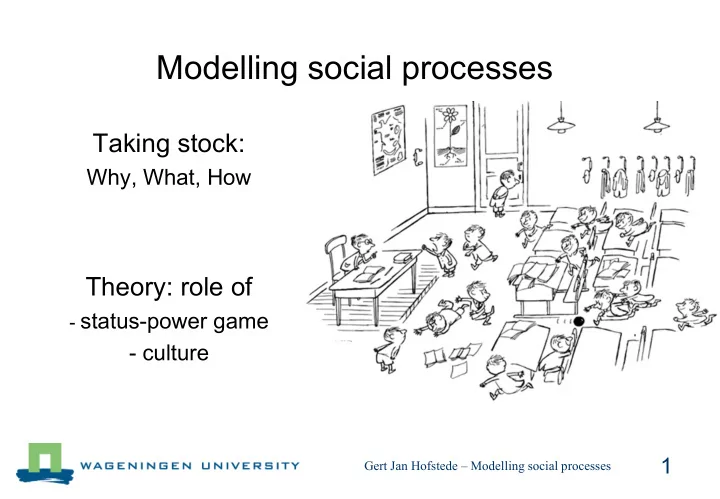

Modelling social processes Taking stock: Why, What, How Theory: role of - status-power game - culture 1 Gert Jan Hofstede – Modelling social processes
Let’s meet in SiLiCo! SiLiCo centre Wageningen: Complex Adaptive Systems 8th ESSA / SiLiCo Summer School in Social Simulation “Agent -based modelling for resilience” 26-30 June 2017 2
Why? Theseus and Procrustes 3
What? • What is social? – Purely social – Instrumental (e.g. € , $) – Applied (e.g. spatial, legal...) • How to model depends – on your research question – on your reference community – on your ambition 4
What? – purely social (1) We are unique personality: Big Five; life experience; me plans, goals, aspirations my family, tribe, country; moral profession; team, organization: circle(s) norms, values human nature: everybody status – power drives, emotions; genes, hormones, brains, cultures 5
Purely social (2) We belong / commit to groups personality: Big Five; life experience; me plans, goals, aspirations my family, tribe, country; moral profession; team, organization: circle(s) norms, values human nature: everybody status – power drives, emotions; genes, hormones, brains, cultures 6
Purely social (3) We are all the same personality: Big Five; life experience; me plans, goals, aspirations my family, tribe, country; moral profession; team, organization: circle(s) norms, values human nature: everybody status – power drives, emotions; genes, hormones, brains, cultures 7
Level of analysis What do you see? 8
Level of analysis 9
So what is a ‘social process’ for you? • Cognitive (mind) • Affiliative • Hierarchichal • Applied Depends on RQ – Economic – Spatial – ... • Emergent (pattern) 10
State of the art • Advances in – Norms, punishment, norm emergence – Theory of mind – Game theory – Commons – Spatial behaviours • Little work on – Human motives (Sociology, social psychology) – Implicit knowledge (e.g. shared values) 11
My modelling dream: Human nature According to Theodore D. Kemper • We are driven to – Confer appropriate ‘status’ – Expect (& ‘claim’) the same – When thwarted: use ‘power’ • We do this in a reference groups context – Strive for equal status across groups – Commit to where we get status • Sociological constructs – As basis for ABM 12
Status conferrals 13
Status claims I.M. Yourman, Ph.D. Hi. I’m ... and I want ... 14
Claiming vs conferring status a lot GOOD lover superhero freedom fighter champion saint BAD baby girl media star donor man spoilt child Deserving conferral complaining citizen woman elderly person teenager terrorist beggar villain nothing Claiming a lot 15
Power moves 16
Status vs power a lot LOVE superhero king lover girl saint baby soldier scientist donor man citizen Deserving conferral woman elderly person FEAR lawyer spoilt child terrorist beggar villain nothing having power a lot 17 .
Social landscape Is a status-power landscape ...whose defaults vary across cultures ...and according to group-based perspective ...and per person. Doema Folketinget 18
So: ‘Raising’ agents using Kemper • Need to navigate social landscape: GRASP – Groups, – Rituals, – Affiliation / – Status: claims, conferrals – Power: enforced vs authority • Everything else can be converted into status – using ‘counts - as’ (Searle) – e.g. possessions, beauty, kindness, reproductive fitness, sex, age, money, ... • Culture is the small print of status-power rules 19
Life goals of business leaders Questions to MBA students: “typical successful business leader in your country is driven by...” Overall ranking Brazil China India Germany USA 1. Growth 4 1 2. Continuity 4 1 - 3. Year profits 3 - 4 4. Personal wealth 3 5. Power 2 3 3 5 6. Honour 4 7. Create sth new 3 8. 10 yr profits 5 4 9. Law - 10.Responsibility emps - 2 11.Ethical norms 1 - 5 2 12.Responsibility soc 5 1 1 13.Game spirit 2 2 14.Patriotism 5 15.Family interests Source: Hofstede et al 2010 p 321. n = 1800, 17 countries. 20
Personality – culture mutual homeostasis system Personality Personality Personality (OCEAN) OCEAN OCEAN Per- bio- characteristic characteristic sonal Life story graphy adaptations adaptations Evolutionary rituals stream of life Base (SAND) characteristic characteristic Cul- his- Story of a society tural institutions institutions tory Culture Culture 21 (CHAOS) Gert Jan Hofstede, June 2008 IDCUL
Vote 1 • You have a choice of holiday destination. Where do you go? – Where it is suitable for someone in my position – Where I went last year – An unknown adventurous place 22
Collectivism – Individualism World map collectivist individualist 23 Gert Jan Hofstede
What builds status? Individualism Collectivist Individualist • loyalty • initiative • role enactment • originality • sameness • difference 24
Who gets status? Individualism 25
Power Distance World map small large Symmetry vs asymmetry: • Allocate status equally or upward 26 • Citizen vs subject
27
What builds status? Power distance Small power distance Large power distance • responsibility • obedience • equitability • pleasing • democratic leadership • autocratic leadership Moving with culture • fairness • efficiency 28
Who gets status? Power distance Large PD, my conferrals status (social importance) Small PD Large PD, my claims other’s status my status 29
Vote 2 • Your subordinate, a clerk at your hotel, has been found dead drunk in a guest room. What do you do? – You fire him – You warn him – You talk to him to find out what’s the matter. 30
Femininity - Masculinity World map feminine masculine Status vs power game: • Sit down and talk vs stand up and fight 31 • Confer status upon weak vs strong
What builds status? Masculinity Feminine Masculine • care • achievement, winning • forgivingness • toughness • empathy • power • non-gendered identity • gendered identity • small gestures • male dominance over women 32
Who gets status? Masculinity graph shows status conferred upon others depending on relative power masculine status feminine other’s power my power relative to mine 33
To conclude... World Map Champlain 1612-1632 34 Gert Jan Hofstede - Data Management
Recommend
More recommend